General
MCF Scholars Program Honours Mentors, Builds Momentum for Phase Two
Published
4 years agoon
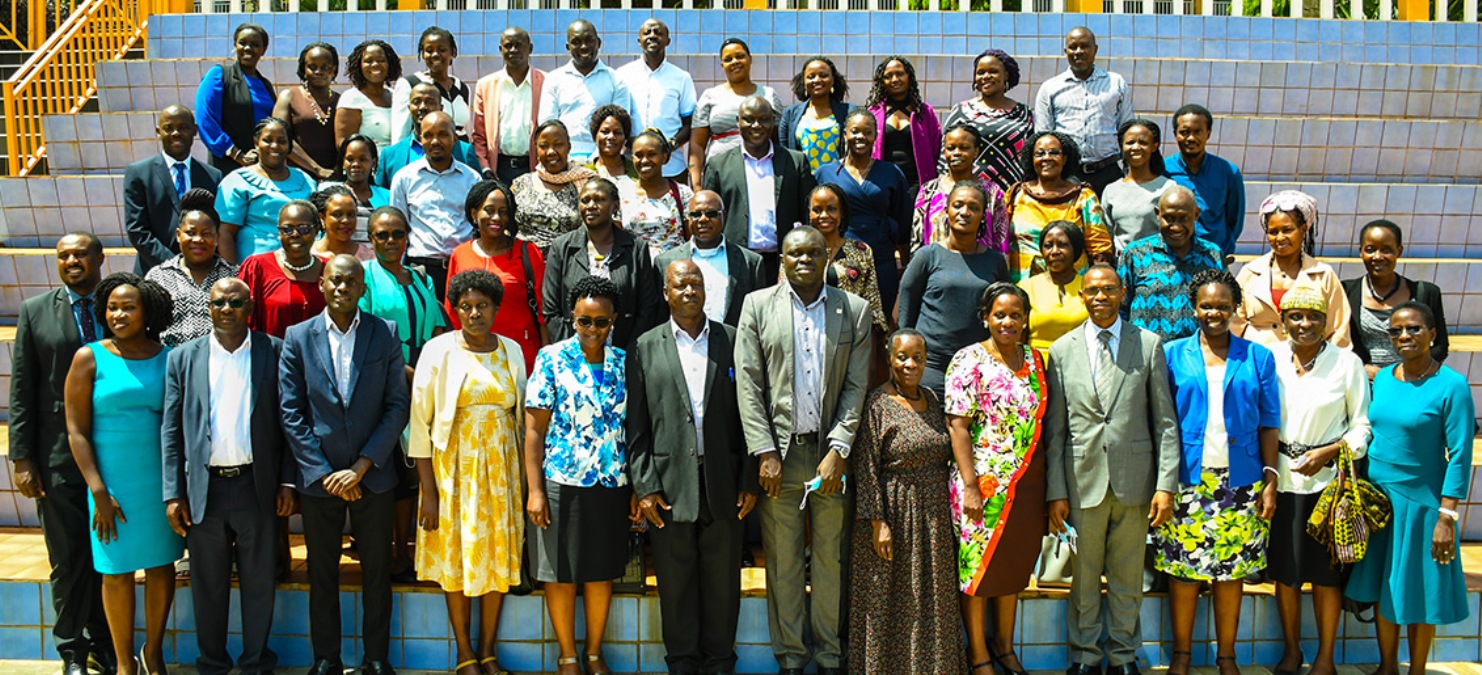
The Mastercard Foundation Scholars’ Program (MCFSP) at Makerere University on Thursday 12th May, 2022 held a symposium at Hotel African during which Mentors were honoured for their role on the program and briefed about the upcoming Phase Two of the same. The symposium was presided over by the Vice Chancellor, Prof. Barnabas Nawangwe represented by the Deputy Vice Chancellor (Academic Affairs) and Chairperson MCFSP Steering Committee, Prof. Umar Kakumba. On the same occasion, Mrs. Susan Opok Tumusiime, the Executive Director, Forum for African Women Educationalists (FAWE) Uganda chapter delivered a keynote address on staying inspired during the mentoriship journey.
The Program Coordinator, Dr. Justine Namaalwa informed participants that the Mastercard Foundation Scholars Program at Makerere University started in 2013 and has to date recruited 1,032 beneficiaries. 438 of these have so far graduated and approximately 58 are set to graduate during the 72nd Graduation Ceremony later this month.
“I extend our sincere personal gratitude to the Mastercard Foundation for the invaluable thoughts and generosity to the African child. This initiative is leading to transformative change in hundreds of African children, their parents, and we their teachers and mentors” remarked Dr. Namaalwa.
She added that over the last eight years MCFSP has upheld the pillars of; identifying the vulnerable, recruiting them into the university and providing them with valuable education.
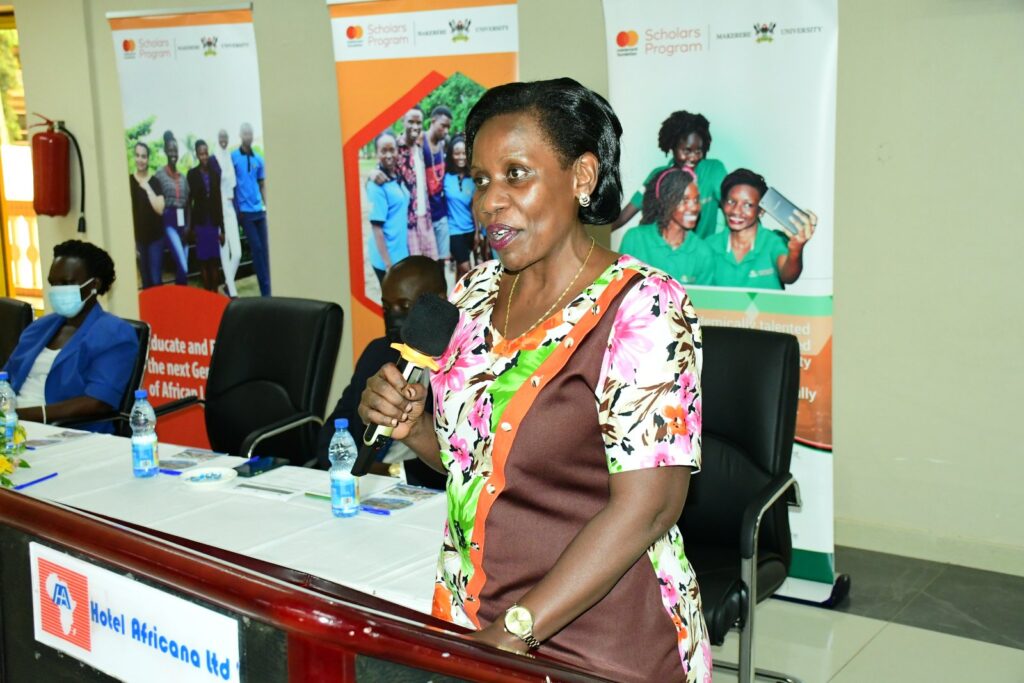
“Beyond the education they receive, we are supposed to prepare them for the world of work, and that is where you our dear mentors have played a significant role. You are their instructors; you participate in providing their education, but are also the mentors that prepare them for their professional careers.
“We chose this day to publicly express our appreciation. I know we have always done this electronically but today, we are here to share a meal and appreciate you but above all, to create fresh momentum for networking because we haven’t seen each other in close to two years” added the Program Coordinator.
Briefing mentors on the upcoming Phase Two of the Program, Dr. Namaalwa shared that the Vice Chancellor had appointed a special seven member committee headed by Professor Emeritus Nelson Sewankambo from the College of Health Sciences (CHS) to oversee the expression of interest. The new phase is expected to commence in August 2023.
She added that the Phase Two expression of interest proposes to double the number of beneficiaries from 1,000 to 2,000. And in the spirit of inclusivity, 25% of the slots will be allocated to refugees, while 15% will be allocated to Persons With Disabilities (PWDs) and 7% to international students.
Furthermore, in the spirit of supporting scholars who have excelled and are desirous of pursuing a career in academia or research, 3% of the slots will be allocated to support graduate training. Another 30% will be allocated to beneficiaries drawn from vulnerable populations as defined by the Uganda Vulnerability Map of 2020. The 30% will also cater for minority tribes such as the Benet, Ik and Batwa, among others. The remaining 20% will be availed to any other vulnerable youth in Uganda including the urban poor.
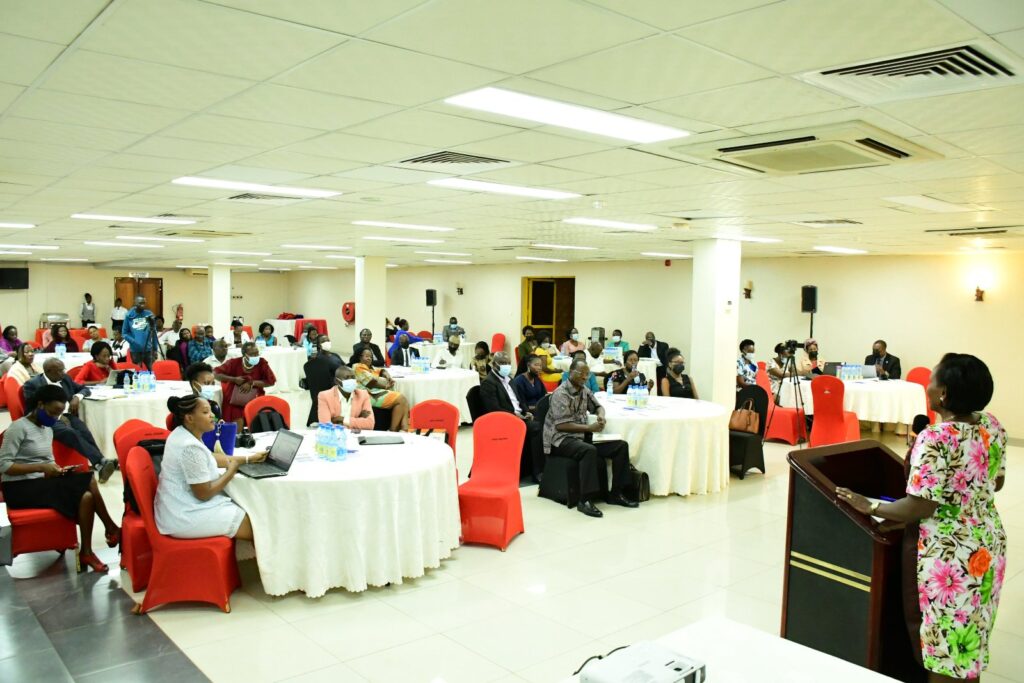
“I am sharing this early enough to prepare you as mentors. We have been in a phase of 1,000 (scholars), a phase of no special categories, but we are walking into a different phase… I welcome you dear mentors to roll up your sleeves and together, we are going to co-create this phase” reassured Dr. Namaalwa.
Speaking on behalf of the MCF Steering Committee, Prof. Mulumba Bwanika Mathias the Dean School of Education, College of Education and External Studies (CEES) applauded the Program Coordinator, Implementation Team and Mentors for the support that enables the scholars to achieve their goals.
“In about two weeks’ time, the majority of our scholars in their final year are going to graduate and the credit goes to you the mentors. We are aware that you frequently interact with our scholars and most importantly, you maintained this during the most difficult time of the lockdown when we had the COVID-19 pandemic. We really do appreciate the kind of work you do” said Prof. Bwanika.
Touching on the upcoming Phase Two, Prof. Bwanika said, “we have submitted the proposal and highly believe that it will go through and we look forward to remaining with you our mentors because we value you. The kind of work you have done to guide these young men and women is massive, and we would like to encourage you and support you in any possible way to ensure that you continue doing this great work.”
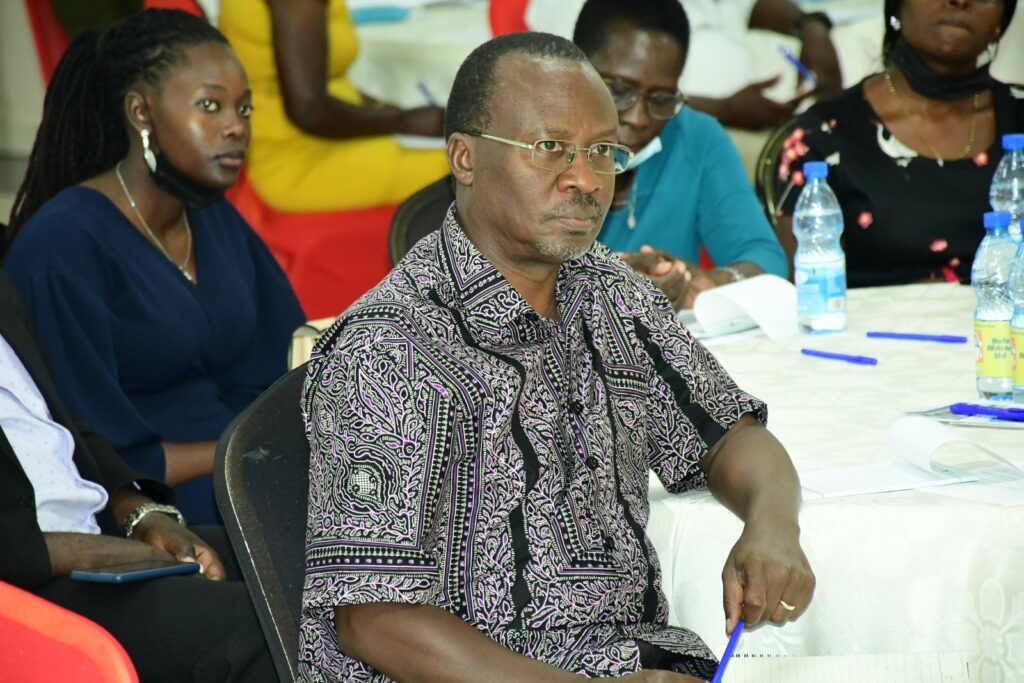
The symposium itinerary would have been incomplete without voices from MCFSP Mentors, Scholars and Alumni. These came in from Mentors – Dr. Nina Olivia Rugambwa and Mr. Aloysius Kwitonda, Alumna – Ms. Marion Apio and Scholar – Ms. Sandra Mukoya.
Some of the lessons shared by the Mentors from their experience included;
- It takes understanding, broad knowledge and patience to mentor scholars
- Mentees need sound financial advice to help them adopt a saving culture and avoid wasting their stipends on expensive items
- Mentees are under a lot of pressure to support their families back home and in some cases are viewed as sole providers of school fees for siblings owing to the stipends they receive.
- Scholars are very knowledgeable especially about technology and should never be underestimated
- Mentors should always have a listening ear and never be quick to judge
- Mentors should relax their own boundaries to facilitate interaction and encourage mentees to open up
- Where possible, mentors should invite mentees to celebrations of personal goals achieved as a way of inspiring them
The Alumna, Ms. Marion Apio appreciated the Mastercard Foundation for sponsoring her education and giving her a platform through which she can reach out to other underprivileged girls. She heartily thanked her mentors for being patient with her endless ’emergencies’. Marion is the CEO of Girls Alive Uganda, an initiative aimed at addressing the lack of sanitary materials for girls in rural communities as well as Head of the Debunk Show, a programme aimed at fact-checking news reports under the Media Challenge Initiative.
Scholar, Ms. Mukoya a finalist of the Bachelor of Social Work and Social Administration. Programme equally expressed her appreciation to the MCFSP, wisely noting that “everyone is a product of mentorship”. She added that mentorship does not only impact the immediate beneficiary but in the long run, helps build a nation. She paid tribute to her mentor for being everything she could have ever asked for in a father.
Prior to delving into her address, the Keynote Speaker Mrs. Opok Tumusiime painted a shocking picture of the state of teenage pregnancy occasioned by the COVID-19 pandemic and associated lockdowns.
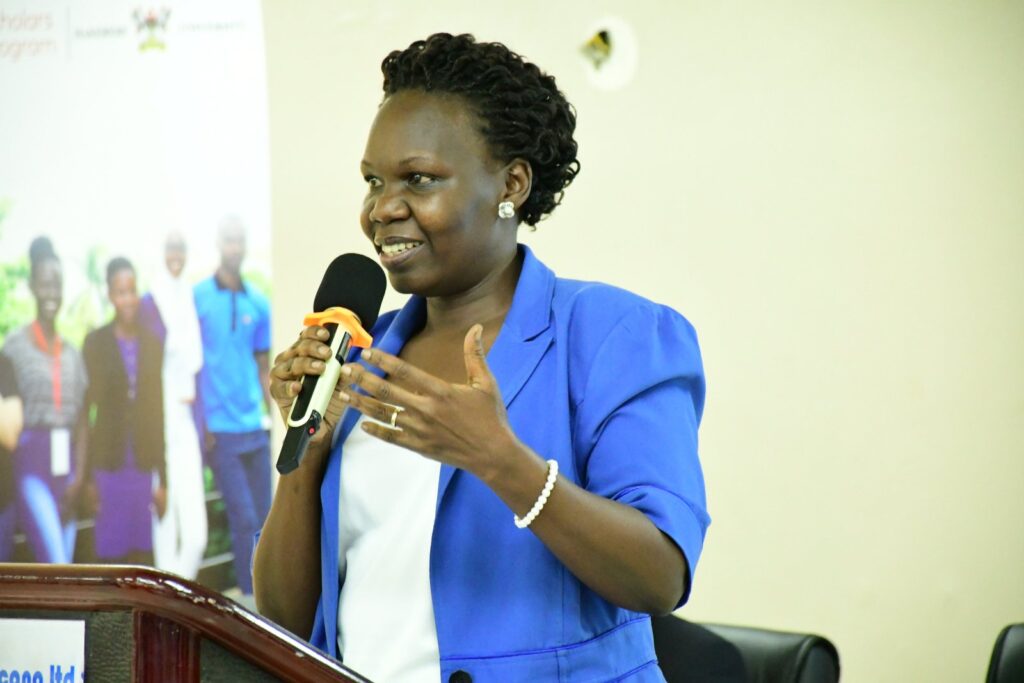
“As FAWE we undertook a study and what came through is the increase in pregnancy of girls aged ten (10) to twenty-four (24) at 22.5% in the three months of March to June of 2020. And when we were looking at the ten (10) to fourteen (14) year olds, the incidence of pregnancies had increased by 366.5%. This is our country, what are we doing?” she pondered to the hushed audience.
To help prevent this grim reality from getting worse, Mrs. Opok Tumusiime urged participants to actively contribute to the “Protect the Girl, Save the Nation” campaign that was initiated by the First Lady and Minister of Education and Sports, Hon. Janet Kataaha Museveni. “As FAWE, we are fundraising and would like to send 2,000 girls back to school.”
Turning to the day’s theme, the Executive Director shared that mentors can become more motivated by;
- Passion: “The only way to do great work is to love what you do. If you haven’t found it yet, keep looking. Don’t settle” Steve Jobs, former Apple CEO.
- Self discovery through helping others
- Seeking knowledge especially in areas not otherwise known and deep-diving in areas known.
- Fostering close relationship, trust and communication at all levels. Communication is not instruction but ought to be guided by cordiality.
- Being self aware and knowing how to present what needs to be presented.
- Celebrating mentees’ advances (however small) along the journey to attaining the full goal.
Mrs. Opok Tumusiime concluded by urging mentors to be the change they want to see. “You and I are responsible for this country and to make our young people better, and whose potential can be attained.”
Acknowledging the Keynote Speaker’s delivery, Prof. Umar Kakumba emphasised that “it is important for everybody to have a mentor in life, regardless of your age, regardless of what stage you are, even post-retirement, you still need a mentor.”
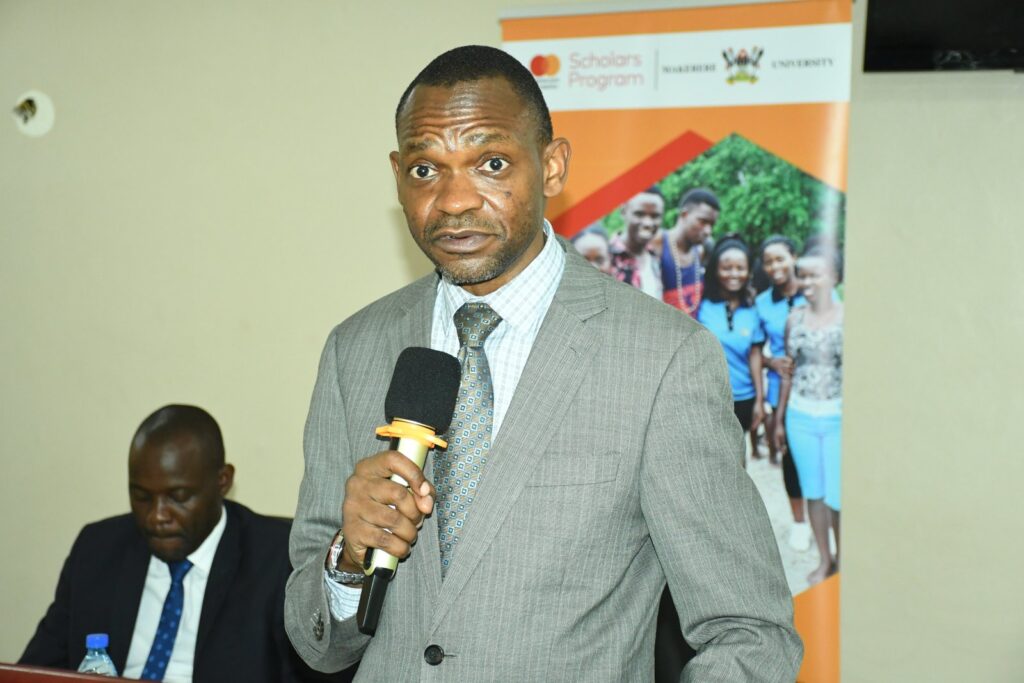
Sharing his own touching story, Prof. Kakumba paid tribute to the mentor who steered him back to the path of education, when the temptation to drop out of school was intense, despite the fact that his family could afford to meet all the associated costs.
“My mother passed on when I was seven…but even back then, there were many challenges that young people faced staying in school, in my case it had nothing to do with fees, money or provision… but today I am a Professor and Deputy Vice Chancellor thanks to the words of some people that touch our lives.
“One of those people, an old man said to me, ‘young man, your mother may have passed away but it was her heart’s desire that you and your siblings should go to school and get a good education’, I felt that I should share this to make all of us appreciate the role of mentorship” counseled Prof. Kakumba to rousing applause from the audience.
He therefore paid tribute to they symposium organisers for creating a platform where mentors could be honoured and further sharpened through sharing life-changing experiences on mentorship.
“I would therefore like to thank the Mastercard Foundation for the generous support, without which we would not have been here today. I extend special thanks to the Program Implementation Team for the wonderful work done in managing our young people” added Prof. Kakumba.
In the words of the day’s emcee, the Principal Public Relations Officer, Member of the MCFSP Steering Committee and Mentor, Ms. Ritah Namisango, “good mentors never tire or retire”. In appreciation of their tireless efforts, the MCFSP presented certificates to the mentors, who are drawn from the ten colleges of Makerere as well as organisations outside the University. They include; DFCU Bank, FAWE, BRAC Uganda, Refugee Law Project (RLP), Family Life Network (FLN), ACCA Uganda, Africa Careers Network (ACN), among others.
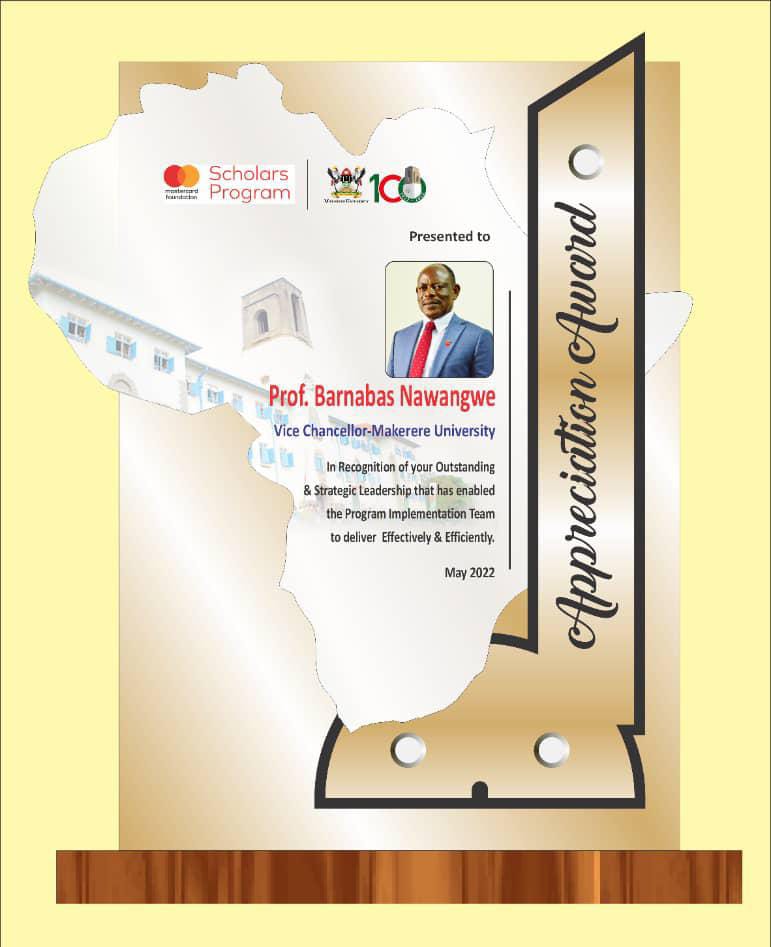
An appreciation award was also presented to the Vice Chancellor, Prof. Barnabas Nawangwe, in recognition of his outstanding and strategic leadership that has enabled the Program Implementation Team to deliver effectively and efficiently.
You may like
-


Over 9,200 to graduate at Makerere University’s 76th Graduation
-


76th Graduation Highlights
-


Meet Najjuka Whitney, The Girl Who Missed Law and Found Her Voice
-


Makerere University School of Public Health Graduates First Cohort of Cost-Effectiveness Analysis Short Course
-
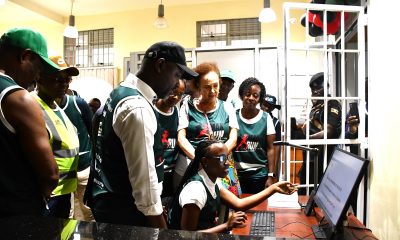

Students empowered to thrive through the Semester
-


Climate variability found to shape malaria trends in Yumbe District
General
Over 9,200 to graduate at Makerere University’s 76th Graduation
Published
7 hours agoon
February 24, 2026
Pomp and colour defined the opening day of the Makerere University’s 76th Graduation Ceremony as thousands gathered to celebrate academic excellence and new beginnings.
The historic ceremony has brought together scholars, families, friends and industry partners in a vibrant celebration of achievement and possibility. Throughout the four-day event, the University will confer degrees and award diplomas to 9,295 graduands in recognition of their dedication and hard work.
Among the graduates, 213 will receive Doctor of Philosophy (PhD) degrees, 2,503 will graduate with Master’s degrees, and 6,343 will earn Bachelor’s degrees. In addition, 206 students will graduate with postgraduate diplomas, while 30 will be awarded undergraduate diplomas.
Of the total number of graduands, 4,262 are female and 5,033 are male. According to Vice Chancellor, this marks the first time in 15 years that male graduands have outnumbered their female counterparts.
The best overall graduand in the Sciences, Esther Ziribaggwa, graduated on the opening day with the Bachelor of Agricultural and Rural Innovation and an impressive Cumulative Grade Point Average (CGPA) of 4.77.

The ceremony marks a proud moment for Makerere University as it continues to nurture top-tier professionals across diverse fields.
While presiding over the graduation, the State Minister for Primary Education, Hon. Dr. Joyce Moriku Kaducu, on behalf of the First Lady and Minister of Education and Sports, Hon. Janet Kataaha Museveni, pointed out that Makerere University is a model institution, where leaders are nurtured, scholars are sharpened, and where dreams have been given direction.
In her address, Hon. Museveni, highlighted Government’s deliberate investment in research, innovation, and infrastructure to strengthen higher education in Uganda.
“The establishment of the Makerere University Research and Innovation Fund (RIF), supports high-impact research and innovation that directly contributes to national priorities and development. Through this initiative, thousands of researchers and innovators have pursued practical, scalable solutions that are transforming communities and key sectors across Uganda,” Mrs Museveni, said.
The Minister also noted that Parliament’s approved a USD 162 million concessional loan to upgrade science, technology, and innovation infrastructure at Makerere University. The funding will facilitate the construction of modern laboratories, smart classrooms, and state-of-the-art facilities for Engineering and Health Sciences, investments expected to position the University firmly within the Fourth Industrial Revolution.
“Government has embarked on the construction of a National Stadium at Makerere University and other institutions of higher learning across the country. This will promote physical education, strengthen talent identification, and boost investment in the sports sector,”

Turning to the graduands, the Minister encouraged them to see themselves not merely as job seekers, but as job creators and solution-makers.
Uganda and Africa need innovators who will modernize agriculture; engineers who will build quality infrastructure; healthcare professionals who will strengthen health systems; and educators who will inspire the next generation,” the Honourable Minister said.
She reminded graduates that they are entering a rapidly changing world shaped by Artificial Intelligence, climate change, and shifting global markets. To thrive, she advised them to remain adaptable, creative, and committed to lifelong learning.
She also encouraged graduates interested in entrepreneurship to tap into the Government’s Parish Development Model, which provides community-based financing and production support.
Quoting Proverbs 3:5–6, the Minister urged the graduates to trust in God as they embark on their next chapter.
She extended special appreciation to the Mastercard Foundation for its 13-year partnership with Makerere University in expanding access to education and empowering young people in Uganda and beyond.
In his speech, the Chancellor of Makerere University, Dr Crispus Kiyonga, urged graduands to harness research, innovation and technology to drive Uganda’s transformation.

“This is a milestone in your lives. You have invested time, discipline and hard work to attain these qualifications. It is important that you derive value from this achievement, not only for yourselves, but for your families and for society.” Dr Kiyonga, said.
Dr. Kiyonga expressed gratitude to the Government of Uganda for its continued financial support to the University, particularly the funding allocated under MakRIF, which he described as critical in strengthening the institution’s research capacity.
“Research plays a very vital role in the development of any community. Makerere as the oldest University in the country is doing a significant amount of research, However, more work is required to mobilize additional resources to further strengthen research at the University.” Dr Kiyonga, noted.
Acknowledging the challenges of a competitive job market, Dr. Kiyonga encouraged graduates to think beyond traditional employment pathways.
“It is true that the job market may not absorb all of you immediately. But the knowledge you have acquired is empowering. You can create work for yourselves, individually or in teams.” Dr Kiyonga, said.
He advised the graduands to embrace discipline, integrity and adaptability in the workplace, and to take advantage of technology and digital platforms to innovate and respond to societal challenges.
“Every development challenge presents an opportunity. Believe that you can apply your knowledge to create solutions with impact.” He said.
Addressing the congregation, the Vice Chancellor, Prof Barnabas Nawangwe, congratulated the graduands, particularly staff and societal leaders on their respective achievements.

“I congratulate all our graduands upon reaching this milestone. In a special way I congratulate the members of staff, Ministers, and Members of Parliament that are graduating today as well as children and spouses of members of staff,” Prof Nawangwe, said.
In his speech, Prof Nawangwe, recognized outstanding PhD students, particularly members of staff. who completed their PhDs in record time without even taking leave from their duties.
He called upon graduates not to despise humble beginnings but rather reflect on the immense opportunities around them and rise to the occasion as entrepreneurs.
“You are all graduating with disciplines that are needed by society. We have equipped you with the knowledge and skills that will make you employable or create your own businesses and employ others. Do not despair if you cannot find employment. Instead, reflect on the immense opportunities around you and rise to the occasion as an entrepreneur,” Prof Nawangwe, said.
Prof Nawangwe called upon the graduands of PhDs to use their degrees to transform the African continent.
“As you leave the gates of Makerere I urge you to put to good use the knowledge you have received from one of the best universities in the World to improve yourselves, your families, your communities, your Country and humanity. Let people see you and know that you are a Makerere alumnus because of the way you carry yourself in society with dignity and integrity. Put your trust in God and honour your parents and opportunities will be opened for you,” Prof Nawangwe, said.
Delivering a key note address, Prof. Nicholas Ozor, the Executive Director of the African Technology Policy Studies Network Nairobi, Kenya ((ATPS). Reminded the graduates that a degree is not a finish line but the beginning of accountability. “The world is a complex, fast changing and deeply unequal. Degrees make you responsible for others not better than them,” Prof Ozor, said.

The 76th Graduation Ceremony of Makerere University will be held from Tuesday 24th to Friday 27th February, 2026. A total of 213 PhDs (87 female, 126 male), 2,503 Masters (1,087 female, 1,416 male), 206 Postgraduate Diplomas (80 female, 126 male), 6,343 Undergraduate Degrees (2,999 female, 3,344 male), and 30 Undergraduate Diplomas (9 female, 21 male) will be graduating from all the Colleges.
Ms. Sarah Aloyo and Ms. Nakato Dorothy both students of the Bachelor of Procurement and Supply Chain Management emerged as the best in the Humanities and Best Overall students with a CGPA of 4.93. Mr. Ssewalu Abdul, a Bachelor of Leisure and Hospitality Management student emerged second best in the Humanities with a CGPA 4.90. Ms. Esther Ziribaggwa emerged as the best student in the Sciences with a CGPA of 4.77 in the Bachelor of Agricultural and Rural Innovation, while Mr. Simon Mungudit emerged second best in the Sciences with a CGPA of 4.76 in the Bachelor of Science in Petroleum Geoscience and Production.
Commencement Speakers
- Day 1 – Prof. Nicholas Ozor, the Executive Director of the African Technology Policy Studies Network, Nairobi, Kenya
- Day 2 – Prof. Dr. Maggie Kigozi, Chairperson Makerere University Endowment Fund Board
- Day 3 – Dr. Patricia Adongo Ojangole, Managing Director, Uganda Development Bank Limited
- Day 4 – Ms. Reeta Roy, Former President & Chief Executive Officer, Mastercard Foundation
The 76th Graduation Ceremony will be held at the Freedom Square following the schedule below:
Tuesday, 24th February, 2026
College of Agricultural and Environmental Sciences (CAES)
College of Computing and Information Sciences (CoCIS)
College of Education and External Studies (CEES)
School of Law (SoL)
Livestream Link for Day 1: https://youtube.com/live/wVGPA0FJ9pU
Wednesday, 25th February, 2026
College of Health Sciences (CHS)
College of Natural Sciences (CoNAS)
College of Veterinary Medicine, Animal Resources and Bio-security (CoVAB)
School of Public Health (SPH)
Thursday, 26th February, 2026
Makerere University Business School (MUBS)
College of Business and Management Sciences (CoBAMS)
Friday, 27th February, 2026
College of Engineering, Design, Art and Technology (CEDAT)
College of Humanities and Social Sciences (CHUSS)
Institute of Gender and Development Studies (IGDS)
Makerere Institute of Social Research (MISR)
General
Mak Selected to Host Alliance for African Partnership Africa Office
Published
1 day agoon
February 23, 2026
Makerere University has been selected to host the Africa Office of the Alliance for African Partnership (AAP). The significant milestone that underscores Makerere’s role in fostering research, innovation, and global collaborations across the continent was announced at a meeting of the University’s Central Management with an AAP delegation on 23rd February 2026.
Makerere’s selection was based on the University’s robust commitment, alignment with the AAP’s Strategic Plan, and proven ability to manage consortium activities. The AAP, which was initiated by Michigan State University (MSU) in collaboration with Ten African Universities and agricultural policy research networks in 2016, targets critical challenges in education, youth empowerment, health and nutrition, agri-food systems, science and technology, water, energy, environment, and culture and society.
Addressing the delegation consisting of AAP Co-Directors from MSU, Dr. Jose Jackson-Malete and Dr. Amy Jamison, accompanied by newly-appointed Director of the AAP Africa Office, Dr. Racheal Ddungu Mugabi and Ms. Clare Cheromoi, the Vice Chancellor, Prof. Barnabas Nawangwe who appreciated the choice of Makerere to host the Africa Office said:
“One of the greatest challenges facing African universities is PhD training, particularly supervisory capacity. Through partnerships such as the Alliance for African Partnership we can leverage international expertise to strengthen supervision—whether through training supervisors or through joint supervision arrangements.”
Prof. Nawangwe equally applauded joint initiatives such as the Grant Writing and Publication project, which gave rise to the establishment of a Writing Centre that he said can be used to build capacity in AAP member universities with Makerere as the hub. Officially launched on 21st March 2023, the project is living up to its expectation of becoming a springboard for strong postdoctoral collaborative research for both institutions and other US universities.
Dr. Titus Awokuse, Vice Provost and Dean for International Studies and Programs at Michigan State University (MSU) who attended virtually, reiterated that Makerere’s selection reflects its long-standing commitment to advancing African higher education, research excellence, and meaningful global collaboration.
Reflecting on the origins of the Alliance for African Partnerships (AAP), Dr. Awokuse explained that nearly a decade ago, MSU initiated a transformative conversation in Atlanta centered on the question: How should we partner differently? From this dialogue emerged AAP—an Africa-centered consortium that now brings together 12 institutions across Africa and the United States.

He emphasized that AAP is grounded in equity, mutual benefit, shared leadership, and deep respect for African priorities and expertise. Since its founding, MSU has served as convener and key supporter, working with member institutions to strengthen research collaboration, promote faculty and student engagement, and address shared development priorities.
Dr. Awokuse underscored that AAP’s success is the result of collective vision and commitment, not the efforts of a single institution. He paid tribute to Lilongwe University of Agriculture and Natural Resources for hosting the Africa Office in its early years and acknowledged the foundational leadership of the inaugural Africa Office Director.
He described the launch of the Africa Office at Makerere University as a significant milestone that reinforces Africa-led leadership, strengthens regional collaboration, and enhances responsiveness to emerging opportunities. MSU, he affirmed, remains fully committed to AAP and to working closely with Makerere and all consortium partners to expand collaborative research, nurture the next generation of scholars, and advance Africa-led solutions to global challenges.
The newly-appointed AAP Africa Office Director, Dr. Racheal Ddungu Mugabi is a member of faculty in the Department of Development Studies, Institute of Gender and Development Studies. Her work on intersectional inequalities in Uganda and other Global South regions uniquely positions her to drive collaborative research and partnerships at the Africa Office.
Initially founded by ten African Universities and MSU, AAP now comprises eleven African members including; the African Network of Agricultural Policy Institutes (ANAPRI)-Zambia, Egerton University-Kenya, Lilongwe University of Agriculture and Natural Resources (LUANAR)-Malawi, Makerere University-Uganda, United States International University-Africa-Kenya, Universite Cheikh Anta Diop-Senegal, Universite Yambo Ouologuem de Bamako-Mali, University of Botswana-Botswana, University of Dar es Salaam-Tanzania, University of Nigeria, Nsukka-Nigeria, and the latest, University of Pretoria-South Africa.
These Universites collaborate under Focal Points to advance policy-relevant research and sustainable development. Makerere University’s Focal Point is Prof. Robert Wamala, Director of Research, Innovations and Partnerships (DRIP).
Addressing the University Management, Dr. Jackson-Malete outlined the African Futures Research Leadership Program, which nurtures early career scholars through mentorship and skill-building as one of AAP’s flagship programs. She noted that the Program that prioritizes female participants or men committed to promoting women in higher education has for the first time during its fifth cohort admitted the first male, Dr. Alfadaniels Mabingo from the Department of Performing Arts and Film, Makerere University.
The AAP Africa Office at Makerere will coordinate activities, boost research collaboration, mobilize resources, and enhance global engagements for socio-economic transformation. This aligns with Makerere‘s broader goals of leveraging international expertise to build resilient institutions.
View more photos from the event: https://flic.kr/s/aHBqjCLjoA
Trending
-

 Humanities & Social Sciences2 days ago
Humanities & Social Sciences2 days agoMeet Najjuka Whitney, The Girl Who Missed Law and Found Her Voice
-

 Health6 days ago
Health6 days agoUganda has until 2030 to end Open Defecation as Ntaro’s PhD Examines Kabale’s Progress
-

 Agriculture & Environment5 days ago
Agriculture & Environment5 days agoUganda Martyrs Namugongo Students Turn Organic Waste into Soap in an Innovative School Project on Sustainable Waste Management
-

 General6 days ago
General6 days agoMastercard Foundation Scholars embrace and honour their rich cultural diversity
-

 Health2 weeks ago
Health2 weeks agoCall for Applications: Short Course in Molecular Diagnostics March 2026
